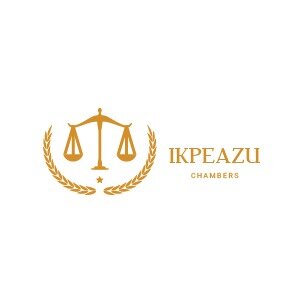Best Merger & Acquisition Lawyers in Gwarinpa
Share your needs with us, get contacted by law firms.
Free. Takes 2 min.
List of the best lawyers in Gwarinpa, Nigeria
About Merger & Acquisition Law in Gwarinpa, Nigeria
Merger & Acquisition (M&A) law in Gwarinpa, Nigeria, is a part of corporate law that deals with the consolidation of companies or assets. It's a complex field involving various legal, financial, and regulatory considerations. Gwarinpa, being a bustling district in Abuja, sees a fair amount of M&A activity, requiring diligent legal oversight to ensure compliance with Nigerian laws and regulations. The area has a growing business community, and understanding the local legal landscape can be crucial for successful transactions.
Why You May Need a Lawyer
Mergers and acquisitions can be intricate processes involving numerous stakeholders. Here are some common situations where you might need legal assistance:
- Negotiation: Skilled lawyers can negotiate favorable terms and protect your interests.
- Due Diligence: Comprehensive legal due diligence is critical to uncover potential liabilities or issues associated with the target company.
- Regulatory Compliance: Ensuring the transaction complies with local and national laws.
- Structuring Transactions: Properly structuring deals to maximize financial and legal benefits.
- Documentation: Drafting and reviewing contracts and other essential documents.
Local Laws Overview
Understanding local laws is vital for any M&A activity in Gwarinpa. Key aspects include:
- Company and Allied Matters Act (CAMA): Governs company formation, management, and consolidation.
- Investment and Securities Act (ISA): Pertains to capital markets and regulates any securities transactions.
- Federal Competition and Consumer Protection Act: Ensures that mergers do not result in unfair monopoly or hinder competition.
- Local Content Laws: Especially in industries like oil and gas, to promote local involvement.
- Tax Laws: Address the fiscal implications of mergers and acquisitions.
Frequently Asked Questions
What is the typical process of a merger or acquisition in Gwarinpa?
The typical process involves initial negotiations, due diligence, transaction structuring, regulatory approvals, closing the transaction, and integration of the businesses.
Are there specific regulations for cross-border M&As?
Yes, cross-border M&As can be subject to additional regulations, including international trade laws and foreign investment rules, necessitating comprehensive legal advice.
Do mergers and acquisitions always require public announcements?
Public announcements are often required for publicly traded companies but might not be necessary for private transactions unless stipulated by specific regulatory bodies.
What role does the Federal Competition and Consumer Protection Commission play in M&As?
This commission ensures that M&As do not unfairly limit competition and monitors for compliance with antitrust laws.
How are disputes usually resolved in M&As?
Disputes can be resolved through negotiation, mediation, arbitration, or litigation depending on the terms set in the contract.
What are the usual tax implications of M&As in Nigeria?
M&As can have various tax implications, including corporate tax liabilities and possible capital gains tax, which require careful planning and advice.
Can foreign entities undertake mergers or acquisitions in Gwarinpa?
Yes, but they must comply with Nigerian laws on foreign investments and possibly obtain approvals from relevant governmental bodies.
How long does a typical M&A transaction take?
The duration can vary significantly based on the size and complexity of the transaction, ranging from several months to over a year.
Is a merger different from an acquisition?
Yes, a merger is a consolidation of two entities into one, while an acquisition involves one company taking over another.
What is due diligence in the context of M&A?
Due diligence is a comprehensive appraisal of the target business to assess its assets, liabilities, and commercial potential, critical for informed decision-making.
Additional Resources
For more information or assistance, consider reaching out to the following resources:
- Nigeria Bar Association
- Corporate Affairs Commission
- Federal Competition and Consumer Protection Commission
- Investment Promotion Council
- Local law firms specializing in corporate law
Next Steps
If you need legal assistance with M&A in Gwarinpa, consider the following steps:
- Research and Identify: Begin by identifying reputable law firms specializing in M&A.
- Consultation: Arrange consultations to discuss your needs and potential strategies.
- Engage a Lawyer: Once satisfied, formally engage a lawyer or legal team to assist you through the process.
- Regular Updates: Stay in close communication with your legal team to ensure smooth progress.
Lawzana helps you find the best lawyers and law firms in Gwarinpa through a curated and pre-screened list of qualified legal professionals. Our platform offers rankings and detailed profiles of attorneys and law firms, allowing you to compare based on practice areas, including Merger & Acquisition, experience, and client feedback.
Each profile includes a description of the firm's areas of practice, client reviews, team members and partners, year of establishment, spoken languages, office locations, contact information, social media presence, and any published articles or resources. Most firms on our platform speak English and are experienced in both local and international legal matters.
Get a quote from top-rated law firms in Gwarinpa, Nigeria — quickly, securely, and without unnecessary hassle.
Disclaimer:
The information provided on this page is for general informational purposes only and does not constitute legal advice. While we strive to ensure the accuracy and relevance of the content, legal information may change over time, and interpretations of the law can vary. You should always consult with a qualified legal professional for advice specific to your situation.
We disclaim all liability for actions taken or not taken based on the content of this page. If you believe any information is incorrect or outdated, please contact us, and we will review and update it where appropriate.








